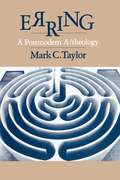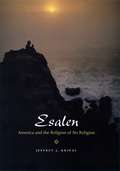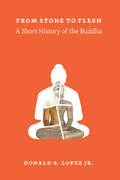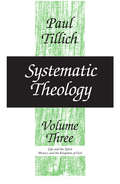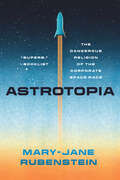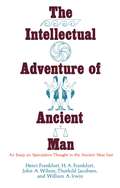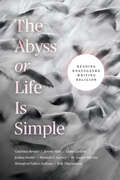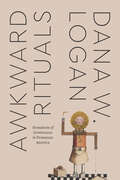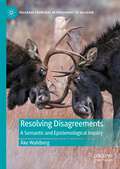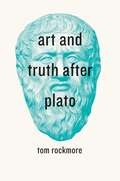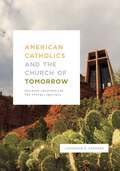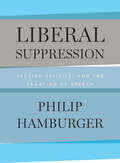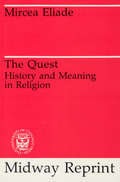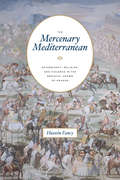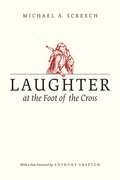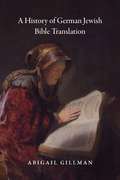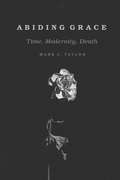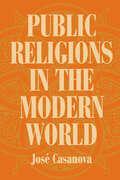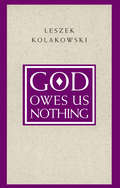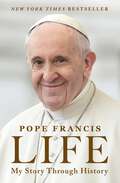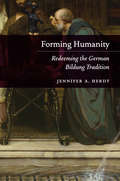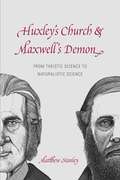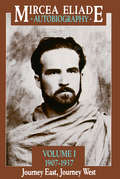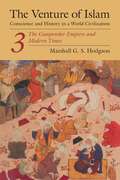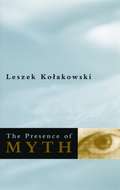- Table View
- List View
Erring: A Postmodern A/theology
by Mark C. Taylor"Erring is a thoughtful, often brilliant attempt to describe and enact what remains of (and for) theology in the wake of deconstruction. Drawing on Hegel, Nietzsche, Derrida, and others, Mark Taylor extends—and goes well beyond—pioneering efforts. . . . The result is a major book, comprehensive and well-informed."—G. Douglas Atkins, Philosophy and Literature "Many have felt the need for a study which would explicate in coherent and accessible fashion the principal tenets of deconstruction, with particular attention to their theological implications. This need the author has addressed in a most impressive manner. The book's effect upon contemporary discussion is apt to be, and deserves to be, far-reaching."—Walter Lowe, Journal of Religion
Esalen: America and the Religion of No Religion
by Jeffrey J. KripalJeffrey Kripal here recounts the spectacular history of Esalen, the institute that has long been a world leader in alternative and experiential education and stands today at the center of the human potential movement. Forged in the literary and mythical leanings of the Beat Generation, inspired in the lecture halls of Stanford by radical scholars of comparative religion, the institute was the remarkable brainchild of Michael Murphy and Richard Price. Set against the heady backdrop of California during the revolutionary 1960s, Esalen recounts in fascinating detail how these two maverick thinkers sought to fuse the spiritual revelations of the East with the scientific revolutions of the West, or to combine the very best elements of Zen Buddhism, Western psychology, and Indian yoga into a decidedly utopian vision that rejected the dogmas of conventional religion. In their religion of no religion, the natural world was just as crucial as the spiritual one, science and faith not only commingled but became staunch allies, and the enlightenment of the body could lead to the full realization of our development as human beings. “An impressive new book. . . . [Kripal] has written the definitive intellectual history of the ideas behind the institute.”—San FranciscoChronicle “Kripal examines Esalen’s extraordinary history and evocatively describes the breech birth of Murphy and Price’s brainchild. His real achievement, though, is effortlessly synthesizing a dizzying array of dissonant phenomena (Cold War espionage, ecstatic religiosity), incongruous pairings (Darwinism, Tantric sex), and otherwise schizy ephemera (psychedelic drugs, spaceflight) into a cogent, satisfyingly complete narrative.”—Atlantic Monthly “Kripal has produced the first all-encompassing history of Esalen: its intellectual, social, personal, literary and spiritual passages. Kripal brings us up-to-date and takes us deep beneath historical surfaces in this definitive, elegantly written book.”—Playboy
From Stone to Flesh: A Short History of the Buddha (Buddhism And Modernity Ser.)
by Donald S. Lopez Jr.We have come to admire Buddhism for being profound but accessible, as much a lifestyle as a religion. The credit for creating Buddhism goes to the Buddha, a figure widely respected across the Western world for his philosophical insight, his teachings of nonviolence, and his practice of meditation. But who was this Buddha, and how did he become the Buddha we know and love today? Leading historian of Buddhism Donald S. Lopez Jr. tells the story of how various idols carved in stone—variously named Beddou, Codam, Xaca, and Fo—became the man of flesh and blood that we know simply as the Buddha. He reveals that the positive view of the Buddha in Europe and America is rather recent, originating a little more than a hundred and fifty years ago. For centuries, the Buddha was condemned by Western writers as the most dangerous idol of the Orient. He was a demon, the murderer of his mother, a purveyor of idolatry. Lopez provides an engaging history of depictions of the Buddha from classical accounts and medieval stories to the testimonies of European travelers, diplomats, soldiers, and missionaries. He shows that centuries of hostility toward the Buddha changed dramatically in the nineteenth century, when the teachings of the Buddha, having disappeared from India by the fourteenth century, were read by European scholars newly proficient in Asian languages. At the same time, the traditional view of the Buddha persisted in Asia, where he was revered as much for his supernatural powers as for his philosophical insights. From Stone to Flesh follows the twists and turns of these Eastern and Western notions of the Buddha, leading finally to his triumph as the founder of a world religion.
Systematic Theology: Life and the Spirit History and the Kingdom of God
by Paul TillichIn this volume, the third and last of his Systematic Theology, Paul Tillich sets forth his ideas of the meaning of human life, the doctrine of the Spirit and the church, the trinitarian symbols, the relation of history to the Kingdom of God, and the eschatological symbols. He handles this subject matter with powerful conceptual ability and intellectual grace. The problem of life is ambiguity. Every process of life has its contrast within itself, thus driving man to the quest for unambiguous life or life under the impact of the Spritual Presence. The Spritual Presence conquers the negativities of religion, culture, and morality, and the symbols anticipating Eternal Life present the answer to the problem of life.
Astrotopia: The Dangerous Religion of the Corporate Space Race
by Mary-Jane RubensteinA revealing look at the parallel mythologies behind the colonization of Earth and space—and a bold vision for a more equitable, responsible future both on and beyond our planet. As environmental, political, and public health crises multiply on Earth, we are also at the dawn of a new space race in which governments team up with celebrity billionaires to exploit the cosmos for human gain. The best-known of these pioneers are selling different visions of the future: while Elon Musk and SpaceX seek to establish a human presence on Mars, Jeff Bezos and Blue Origin work toward moving millions of earthlings into rotating near-Earth habitats. Despite these distinctions, these two billionaires share a core utopian project: the salvation of humanity through the exploitation of space. In Astrotopia, philosopher of science and religion Mary-Jane Rubenstein pulls back the curtain on the not-so-new myths these space barons are peddling, like growth without limit, energy without guilt, and salvation in a brand-new world. As Rubenstein reveals, we have already seen the destructive effects of this frontier zealotry in the centuries-long history of European colonialism. Much like the imperial project on Earth, this renewed effort to conquer space is presented as a religious calling: in the face of a coming apocalypse, some very wealthy messiahs are offering an other-worldly escape to a chosen few. But Rubenstein does more than expose the values of capitalist technoscience as the product of bad mythologies. She offers a vision of exploring space without reproducing the atrocities of earthly colonialism, encouraging us to find and even make stories that put cosmic caretaking over profiteering.
The Intellectual Adventure of Ancient Man: An Essay of Speculative Thought in the Ancient Near East
by Henri Frankfort Thorkild Jacobsen William A. Irwin H.A. FrankfortThe people in ancient times the phenomenal world was teeming with life; the thunderclap, the sudden shadow, the unknown and eerie clearing in the wood, all were living things. This unabridged edition traces the fascinating history of thought from the pre-scientific, personal concept of a "humanized" world to the achievement of detached intellectual reasoning. The authors describe and analyze the spiritual life of three ancient civilizations: the Egyptians, whose thinking was profoundly influenced by the daily rebirth of the sun and the annual rebirth of the Nile; the Mesopotamians, who believed the stars, moon, and stones were all citizens of a cosmic state; and the Hebrews, who transcended prevailing mythopoeic thought with their cosmogony of the will of God. In the concluding chapter the Frankforts show that the Greeks, with their intellectual courage, were the first culture to discover a realm of speculative thought in which myth was overcome.
The Abyss or Life Is Simple: Reading Knausgaard Writing Religion
by Courtney Bender Jeremy Biles Joshua Dubler Liane CarlsonAn absorbing collection of essays on religious textures in Knausgaard’s writings and our time.Min kamp, or My Struggle, is a six-volume novel by Karl Ove Knausgaard and one of the most significant literary works of the young twenty-first century. Published in Norwegian between 2009 and 2011, the novel presents an absorbing first-person narrative of the life of a writer with the same name as the author, in a world at once fully disillusioned and thoroughly enchanted. In 2015, a group of scholars began meeting to discuss the peculiarly religious qualities of My Struggle. Some were interested in Knausgaard’s attention to explicitly religious subjects and artworks, others to what they saw as more diffuse attention to the religiousness of contemporary life. The group wondered what reading these textures of religion in these volumes might say about our times, about writing, and about themselves. The Abyss or Life Is Simple is the culmination of this collective endeavor—a collection of interlocking essays on ritual, beauty, and the end of the world.
Awkward Rituals: Sensations of Governance in Protestant America (Class 200: New Studies In Religion Ser.)
by Dana W. LoganA fresh account of early American religious history that argues for a new understanding of ritual. In the years between the American Revolution and the Civil War, there was an awkward persistence of sovereign rituals, vestiges of a monarchical past that were not easy to shed. In Awkward Rituals, Dana Logan focuses our attention on these performances, revealing the ways in which governance in the early republic was characterized by white Protestants reenacting the hierarchical authority of a seemingly rejected king. With her unique focus on embodied action, rather than the more common focus on discourse or law, Logan makes an original contribution to debates about the relative completeness of America’s Revolution. Awkward Rituals theorizes an under-examined form of action: rituals that do not feel natural even if they sometimes feel good. This account challenges common notions of ritual as a force that binds society and synthesizes the self. Ranging from Freemason initiations to evangelical societies to missionaries posing as sailors, Logan shows how white Protestants promoted a class-based society while simultaneously trumpeting egalitarianism. She thus redescribes ritual as a box to check, a chore to complete, an embarrassing display of theatrical verve. In Awkward Rituals, Logan emphasizes how ritual distinctively captures what does not change through revolution.
Resolving Disagreements: A Semantic and Epistemological Inquiry (Palgrave Frontiers in Philosophy of Religion)
by Åke WahlbergThis book examines how the semantics and metaphysics of disagreement affect the epistemology of disagreement. It thus broadens the philosophical discourse by relating the epistemological discussion of (peer) disagreement to inquiries into the nature of disagreement and disagreeing. By doing this, it paints a new picture of the epistemological situation evoked by disagreement: To the same extent that an interpersonal dispute undermines the justification of the disputing persons’ beliefs, it also presents an obstacle to interpersonal understanding. This follows from the nature of meaning, belief and communication, rightly understood. In demonstrating the relevance of this to philosophical reflections on peer disagreement and resolution of disagreement, the book addresses arguably the most contentious kind of disagreement, namely, religious disagreement. It shows that apparent disagreement in religion suggests that the dialog partners might not have reached sufficient mutual understanding. This has important ramifications for the rationally right conduct in the face of religious disagreement, and for the possibility of rational resolution of religious disputes.
Art and Truth after Plato
by Tom RockmoreDespite its foundational role in the history of philosophy, Plato’s famous argument that art does not have access to truth or knowledge is now rarely examined, in part because recent philosophers have assumed that Plato’s challenge was resolved long ago. In Art and Truth after Plato, Tom Rockmore argues that Plato has in fact never been satisfactorily answered—and to demonstrate that, he offers a comprehensive account of Plato’s influence through nearly the whole history of Western aesthetics. Rockmore offers a cogent reading of the post-Platonic aesthetic tradition as a series of responses to Plato’s position, examining a stunning diversity of thinkers and ideas. He visits Aristotle’s Poetics, the medieval Christians, Kant’s Critique of Judgment, Hegel’s phenomenology, Marxism, social realism, Heidegger, and many other works and thinkers, ending with a powerful synthesis that lands on four central aesthetic arguments that philosophers have debated. More than a mere history of aesthetics, Art and Truth after Plato presents a fresh look at an ancient question, bringing it into contemporary relief.
American Catholics and the Church of Tomorrow: Building Churches for the Future, 1925–1975
by Catherine R. OsborneIn the mid-twentieth century, American Catholic churches began to shed the ubiquitous spires, stained glass, and gargoyles of their European forebears, turning instead toward startling and more angular structures of steel, plate glass, and concrete. But how did an institution like the Catholic Church, so often seen as steeped in inflexible traditions, come to welcome this modernist trend? Catherine R. Osborne’s innovative new book finds the answer: the alignment between postwar advancements in technology and design and evolutionary thought within the burgeoning American Catholic community. A new, visibly contemporary approach to design, church leaders thought, could lead to the rebirth of the church community of the future. As Osborne explains, the engineering breakthroughs that made modernist churches feasible themselves raised questions that were, for many Catholics, fundamentally theological. Couldn’t technological improvements engender worship spaces that better reflected God's presence in the contemporary world? Detailing the social, architectural, and theological movements that made modern churches possible, American Catholics and the Churches of Tomorrow breaks important new ground in the history of American Catholicism, and also presents new lines of thought for scholars attracted to modern architectural and urban history.
Liberal Suppression: Section 501(c)(3) and the Taxation of Speech
by Philip HamburgerIn the course of exempting religious, educational, and charitable organizations from federal income tax, section 501(c)(3) of the Internal Revenue Code requires them to refrain from campaign speech and much speech to influence legislation. These speech restrictions have seemed merely technical adjustments, which prevent the political use of a tax subsidy. But the cultural and legal realities are more disturbing. Tracing the history of American liberalism, including theological liberalism and its expression in nativism, Hamburger shows the centrality of turbulent popular anxieties about the Catholic Church and other potentially orthodox institutions. He argues persuasively that such theopolitical fears about the political speech of churches and related organizations underlay the adoption, in 1934 and 1954, of section 501(c)(3)’s speech limits. He thereby shows that the speech restrictions have been part of a broad majority assault on minority rights and that they are grossly unconstitutional. Along the way, Hamburger explores the role of the Ku Klux Klan and other nativist organizations, the development of American theology, and the cultural foundations of liberal “democratic” political theory. He also traces important legal developments such as the specialization of speech rights and the use of law to homogenize beliefs. Ultimately, he examines a wide range of contemporary speech restrictions and the growing shallowness of public life in America. His account is an unflinching look at the complex history of American liberalism and at the implications for speech, the diversity of belief, and the nation’s future.
The Quest: History and Meaning in Religion (Midway Reprint)
by Mircea EliadeIn The Quest Mircea Eliade stresses the cultural function that a study of the history of religions can play in a secularized society. He writes for the intelligent general reader in the hope that what he calls a new humanism "will be engendered by a confrontation of modern Western man with unknown or less familiar worlds of meaning." "Each of these essays contains insights which will be fruitful and challenging for professional students of religion, but at the same time they all retain the kind of cultural relevance and clarity of style which makes them accessible to anyone seriously concerned with man and his religious possibilities."—Joseph M. Kitagawa, Religious Education
The Mercenary Mediterranean: Sovereignty, Religion, and Violence in the Medieval Crown of Aragon
by Hussein FancySometime in April 1285, five Muslim horsemen crossed from the Islamic kingdom of Granada into the realms of the Christian Crown of Aragon to meet with the king of Aragon, who showered them with gifts, including sumptuous cloth and decorative saddles, for agreeing to enter the Crown’s service. They were not the first or only Muslim soldiers to do so. Over the course of the thirteenth and fourteenth centuries, the Christian kings of Aragon recruited thousands of foreign Muslim soldiers to serve in their armies and as members of their royal courts. Based on extensive research in Arabic, Latin, and Romance sources, The Mercenary Mediterranean explores this little-known and misunderstood history. Far from marking the triumph of toleration, Hussein Fancy argues, the alliance of Christian kings and Muslim soldiers depended on and reproduced ideas of religious difference. Their shared history represents a unique opportunity to reconsider the relation of medieval religion to politics, and to demonstrate how modern assumptions about this relationship have impeded our understanding of both past and present.
Laughter at the Foot of the Cross
by Michael A. Screech“Christian laughter is a maze: you could easily get snarled up within it.” So says Michael A. Screech in his note to readers preceding this collection of fifty-three elegant and pithy essays. As Screech reveals, the question of whether laughter is acceptable to the god of the Old and New Testaments is a dangerous one. But we are fortunate in our guide: drawing on his immense knowledge of the classics and of humanists like Erasmus and Rabelais—who used Plato and Aristotle to interpret the Gospels—and incorporating the thoughts of Aesop, Calvin, Lucian of Samosata, Luther, Socrates, and others, Screech shows that Renaissance thinkers revived ancient ideas about what inspires laughter and whether it could ever truly be innocent. As Screech argues, in the minds of Renaissance scholars, laughter was to be taken very seriously. Indeed, in an era obsessed with heresy and reform, this most human of abilities was no laughing matter.
A History of German Jewish Bible Translation
by Abigail GillmanBetween 1780 and 1937, Jews in Germany produced numerous new translations of the Hebrew Bible into German. Intended for Jews who were trilingual, reading Yiddish, Hebrew, and German, they were meant less for religious use than to promote educational and cultural goals. Not only did translations give Jews vernacular access to their scripture without Christian intervention, but they also helped showcase the Hebrew Bible as a work of literature and the foundational text of modern Jewish identity. This book is the first in English to offer a close analysis of German Jewish translations as part of a larger cultural project. Looking at four distinct waves of translations, Abigail Gillman juxtaposes translations within each that sought to achieve similar goals through differing means. As she details the history of successive translations, we gain new insight into the opportunities and problems the Bible posed for different generations and gain a new perspective on modern German Jewish history.
Abiding Grace: Time, Modernity, Death (Religion And Postmodernism Ser.)
by Mark C. TaylorPost-war, post-industrialism, post-religion, post-truth, post-biological, post-human, post-modern. What succeeds the post- age? Mark C. Taylor returns here to some of his central philosophical preoccupations and asks: What comes after the end? Abiding Grace navigates the competing Hegelian and Kierkegaardian trajectories born out of the Reformation and finds Taylor arguing from spaces in between, showing how both narratives have shaped recent philosophy and culture. For Hegel, Luther’s internalization of faith anticipated the modern principle of autonomy, which reached its fullest expression in speculative philosophy. The closure of the Hegelian system still endures in the twenty-first century in consumer society, financial capitalism, and virtual culture. For Kierkegaard, by contrast, Luther’s God remains radically transcendent, while finite human beings and their world remain fully dependent. From this insight, Heidegger and Derrida developed an alternative view of time in which a radically open future breaks into the present to transform the past, demonstrating that, far from autonomous, life is a gift from an Other that can never be known. Offering an alternative genealogy of deconstruction that traces its pedigree back to readings of Paul by way of Luther, Abiding Grace presents a thoroughgoing critique of modernity and postmodernity’s will to power and mastery. In this new philosophical and theological vision, history is not over and the future remains endlessly open.
Public Religions in the Modern World
by José CasanovaIn a sweeping reconsideration of the relation between religion and modernity, Jose Casanova surveys the roles that religions may play in the public sphere of modern societies. During the 1980s, religious traditions around the world, from Islamic fundamentalism to Catholic liberation theology, began making their way, often forcefully, out of the private sphere and into public life, causing the "deprivatization" of religion in contemporary life. No longer content merely to administer pastoral care to individual souls, religious institutions are challenging dominant political and social forces, raising questions about the claims of entities such as nations and markets to be "value neutral", and straining the traditional connections of private and public morality. Casanova looks at five cases from two religious traditions (Catholicism and Protestantism) in four countries (Spain, Poland, Brazil, and the United States). These cases challenge postwar—and indeed post-Enlightenment—assumptions about the role of modernity and secularization in religious movements throughout the world. This book expands our understanding of the increasingly significant role religion plays in the ongoing construction of the modern world.
God Owes Us Nothing: A Brief Remark on Pascal's Religion and on the Spirit of Jansenism
by Leszek KolakowskiGod Owes Us Nothing reflects on the centuries-long debate in Christianity: how do we reconcile the existence of evil in the world with the goodness of an omnipotent God, and how does God's omnipotence relate to people's responsibility for their own salvation or damnation. Leszek Kolakowski approaches this paradox as both an exercise in theology and in revisionist Christian history based on philosophical analysis. Kolakowski's unorthodox interpretation of the history of modern Christianity provokes renewed discussion about the historical, intellectual, and cultural omnipotence of neo-Augustinianism. "Several books a year wrestle with that hoary conundrum, but few so dazzlingly as the Polish philosopher's latest."—Carlin Romano, Washington Post Book World "Kolakowski's fascinating book and its debatable thesis raise intriguing historical and theological questions well worth pursuing."—Stephen J. Duffy, Theological Studies "Kolakowski's elegant meditation is a masterpiece of cultural and religious criticism."—Henry Carrigan, Cleveland Plain Dealer
Life: My Story Through History
by Pope FrancisFor the first time, Pope Francis tells the story of his life as he looks back on the momentous world events that have changed history—from his earliest years during the outbreak of World War II in 1939 to the turmoil of today. An extraordinary personal and historical journey, Life is the story of a man and a world in dramatic change. Pope Francis recalls his life through memories and observations of the most significant occurrences of the past eight decades, from the Holocaust to the fall of the Berlin Wall, Videla’s coup in Argentina to the moon landing in 1969, and even the 1986 World Cup in which Maradona scored the unforgettable “hand of God” goal.Here are the frank assessments and intimate insights of a pastor reflecting on the Nazi extermination of the Jews, the atomic bombings of Hiroshima and Nagasaki, the 2001 terrorist attack on America and the collapse of the Twin Towers, the great economic recession of 2008, the Covid-19 pandemic, the retirement of Pope Benedict XVI, and the subsequent conclave that elected him Pontiff. The “pope callejero” recounts these world-changing moments with the candor and compassion that distinguishes him, and offers important messages on major crises confronting us now, including social inequalities, climate change, international war, atomic weapons, racial discrimination, and the battles over social and cultural issues.Translated from the Italian by Aubrey Botsford
Forming Humanity: Redeeming the German Bildung Tradition
by Jennifer A. HerdtNow in paperback, Forming Humanity reveals bildung, or ethical formation, as the key to post-Kantian thought. Kant’s proclamation of humankind’s emergence from “self-incurred immaturity” left his contemporaries with a puzzle: What models should we use to sculpt ourselves if we no longer look to divine grace or received authorities? Deftly uncovering the roots of this question in Rhineland mysticism, Pietist introspection, and the rise of the bildungsroman, Jennifer A. Herdt reveals bildung, or ethical formation, as the key to post-Kantian thought. This was no simple process of secularization, in which human beings took responsibility for something they had earlier left in the hands of God. Rather, theorists of bildung, from Herder through Goethe to Hegel, championed human agency in self-determination while working out the social and political implications of our creation in the image of God. While bildung was invoked to justify racism and colonialism by stigmatizing those deemed resistant to self-cultivation, it also nourished ideals of dialogical encounter and mutual recognition. Herdt reveals how the project of forming humanity lives on in our ongoing efforts to grapple with this complicated legacy.
Huxley's Church and Maxwell's Demon: From Theistic Science to Naturalistic Science
by Matthew StanleyDuring the Victorian period, the practice of science shifted from a religious context to a naturalistic one. It is generally assumed that this shift occurred because naturalistic science was distinct from and superior to theistic science. Yet as Huxley’s Church and Maxwell’s Demon reveals, most of the methodological values underlying scientific practice were virtually identical for the theists and the naturalists: each agreed on the importance of the uniformity of natural laws, the use of hypothesis and theory, the moral value of science, and intellectual freedom. But if scientific naturalism did not rise to dominance because of its methodological superiority, then how did it triumph? Matthew Stanley explores the overlap and shift between theistic and naturalistic science through a parallel study of two major scientific figures: James Clerk Maxwell, a devout Christian physicist, and Thomas Henry Huxley, the iconoclast biologist who coined the word agnostic. Both were deeply engaged in the methodological, institutional, and political issues that were crucial to the theistic-naturalistic transformation. What Stanley’s analysis of these figures reveals is that the scientific naturalists executed a number of strategies over a generation to gain control of the institutions of scientific education and to reimagine the history of their discipline. Rather than a sudden revolution, the similarity between theistic and naturalistic science allowed for a relatively smooth transition in practice from the old guard to the new.
Mircea Eliade: Journey East, Journey West, 1907–1937
by Mircea Eliade"Here finally are Eliade's memoirs of the first thirty years of his life in Mac Linscott Rickett's crisp and lucid English translation. They present a fascinating account of the early development of a Renaissance talent, expressed in everything from daily and periodical journalism, realistic and fantastic fiction, and general nonfiction works to distinguished contributions to the history of religions. Autobiography follows an apparently amazingly candid report of this remarkable man's progression from a mischievous street urchin and literary prodigy, through his various love affairs, a decisive and traumatic Indian sojourn, and active, brilliant participation in pre-World War II Romanian cultural life."—Seymour Cain, Religious Studies Review
The Gunpowder Empires and Modern Times: The Gunpowder Empires And Modern Times (The Venture of Islam: Conscience and History in a World Civilization)
by Marshall G.S. HodgsonThe Venture of Islam has been honored as a magisterial work of the mind since its publication in early 1975. In this three-volume study, illustrated with charts and maps, Hodgson traces and interprets the historical development of Islamic civilization from before the birth of Muhammad to the middle of the twentieth century. This work grew out of the famous course on Islamic civilization that Hodgson created and taught for many years at the University of Chicago. In this concluding volume of The Venture of Islam, Hodgson describes the second flowering of Islam: the Safavi, Timuri, and Ottoman empires. The final part of the volume analyzes the widespread Islamic heritage in today's world. "This is a nonpareil work, not only because of its command of its subject but also because it demonstrates how, ideally, history should be written."—The New Yorker
The Presence of Myth
by Leszek Kolakowski"[An] important essay by a philosopher who more convincingly than any other I can think of demonstrates the continuing significance of his vocation in the life of our culture."—Karsten Harries, The New York Times Book Review With The Presence of Myth, Kolakowski demonstrates that no matter how hard man strives for purely rational thought, there has always been-and always will be-a reservoir of mythical images that lend "being" and "consciousness" a specifically human meaning. "Kolakowski undertakes a philosophy of culture which extends to all realms of human intercourse—intellectual, artistic, scientific, and emotional. . . . [His] book has real significance for today, and may well become a classic in the philosophy of culture."—Anglican Theological Review
